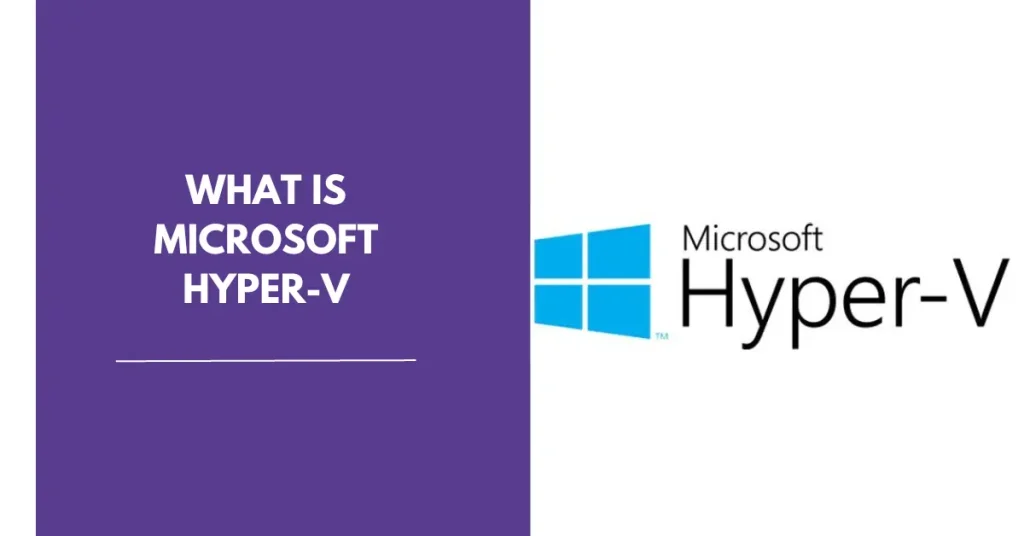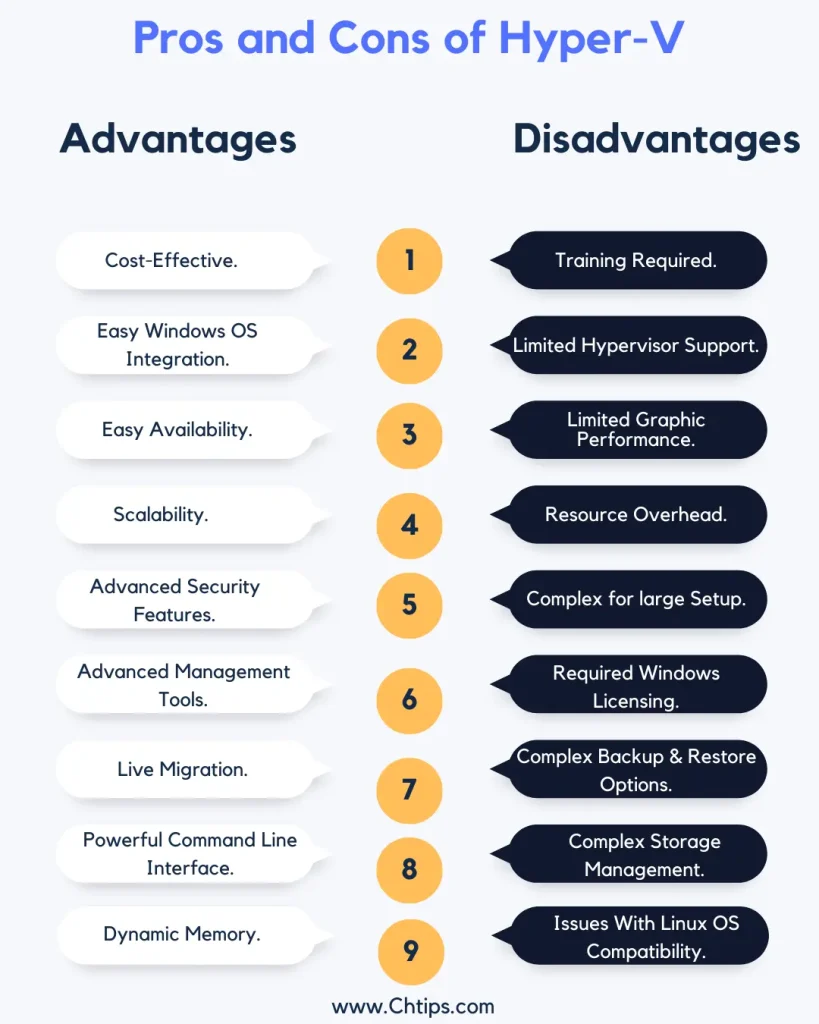Microsoft Hyper-V was launched on 28 June 2008
Microsoft Hyper-V is a well-known and widely used vitalization application solution that offers users a variety of silent features and characteristics.
Microsoft Hyper-V is a hypervisor-based virtualization platform capable of creating and managing virtual machines [VMs] on the Windows operating system to handle and use multiple computers on a single server.
There are several significant advantages and disadvantages of Hyper-V | Pros and cons of Hyper-V that have to be taken into consideration before selecting any virtualization platform.
Microsoft Hyper-V is enabled with significant features such as resource utilization, resource management, enhanced security features, and workload consolidation.
Hyper-V can directly access the hardware devices without the intervention of a host operating system, significantly reducing the overall cost of hardware devices and their services.
What is Microsoft Hyper-V
Microsoft designed and developed a hypervisor-based virtualization platform known as Hyper-V.
The hypervisor technology, also known as a Virtual Machine Monitor (VMM), is software or firmware that enables multiple operating systems to use and utilize hardware resources.
Microsoft Hyper-V is a native hypervisor that is a Windows-based application virtualization system. It is a physical system that helps virtual machines operate successfully.

This system reduces the hardware and peripheral expenses considerably. Hyper-V provides hardware-level virtualization, giving each VM its own virtual CPU, memory, storage, and networking resources.
Microsoft Hyper-V has some fantastic features that make it popular among users.
They include live migration, high availability, and virtual desktop infrastructure (VDI).
They are highly cost-effective, reliable, and highly scalable.
It can be managed through the Microsoft Management Console (MMC) snap-in, and it supports various operating systems such as Windows, Linux, and others.
Hyper-V is widely used in enterprise environments for server consolidation, test and development, and disaster recovery.
Advantages and Disadvantages of Hyper-V | Pros and Cons of Hyper-V In Tabular Form
Hyper-V is an application designed and developed by Microsoft Corporation that helps users use and run multiple virtual machines on a single physical server.
Below, I have mentioned some of the advantages and disadvantages of Hyper-V.
| # | Advantages of Hyper-V | Disadvantages of Hyper-V |
| 1 | Cost-Effective. | Training Required. |
| 2 | Easy Windows OS Integration. | Limited Hypervisor Support. |
| 3 | Easy Availability. | Limited OS Support for Older Versions. |
| 4 | Scalability. | Limited Graphic Performance. |
| 5 | Advanced Security Features. | Resource Overhead. |
| 6 | Advanced Management Tools. | Complex for large Setup. |
| 7 | Snapshot and Checkpoint Features. | Required Windows Licensing. |
| 8 | Live Migration. | Integration Issues with Non-Microsoft Operating System. |
| 9 | Powerful Command Line Interface. | Complex Backup & Restore Options. |
| 10 | Bitlocker Support. | Complex Storage Management. |
| 11 | Dynamic Memory. | Issues With Linux OS Compatibility. |
5 Pros of Hyper- V
- Cost-Effective.
- Easy Windows OS Integration.
- Easy Availability.
- Scalability.
- Advanced Security Features.
- Advanced Management Tools.
- Snapshot and Checkpoint Features.
- Live Migration.
- Powerful Command Line Interface.
- Bitlocker Support.
- Dynamic Memory.
#1. Cost-Effective.
Microsoft Hyper-V is the included feature of the Windows Server operating system.
Therefore, it is inexpensive as the user does not need additional installation of this application.
#2. Easy Windows OS Integration.
The Hyper-V application can be easily integrated with the Windows operating system, and the server edition comes with a preinstall Hyper-V application.
#3. Easy Availability.
Live migration is one of the readily available features in the Hyper-V application.
#4. Scalability.
Hyper-V can handle a large number of virtual machines on a single host, making it more scalable.
#5. Advanced Security Features.
Hyper-V has significant features like encryption, which is considered to be an enhanced advanced security feature.
Useful Video: Advantages and Disadvantages of Hyper-V
5 Cons of Hyper- V
- Training Required.
- Limited Hypervisor Support.
- Limited OS Support for Older Versions.
- Limited Graphic Performance.
- Resource Overhead.
- Complex from large Setup.
- Required Windows Licensing.
- Integration Issues with Non-Microsoft Operating System.
- Complex Backup & Restore Options.
- Complex Storage Management.
- Issues With Linux OS Compatibility.
#1. Training Required.
Hyper-V uses, and implementation requires information and training for new users as the features and options available in the application can be confusing for beginners.
#2. Limited Hypervisor Support.
Hypervisor support is predominantly used for Windows operating systems and services, which makes it harder to support non-Microsoft products and services.
#3. Limited OS Support for Older Versions.
Microsoft needs to provide support for older versions of Microsoft products and services. This is considered to be the significant disadvantage of Hyper-V.
#4. Limited Graphic Performance
Hyper-V was not designed and developed to work efficiently with high-end graphical applications.
#5. Resource Overhead.
Hyper-V can have higher resource overhead than some other hypervisors, potentially impacting the overall performance of the host system.
Features of Hyper-V
- Hypervisor Technology.
- Integration with Windows Ecosystem.
- Virtual Machine Management.
- Snapshots and Cloning.
- Live Migration.
- Resource Management.
- Security Features.
People Are Also Reading
- Advantages and Disadvantages of Computer Systems
- Advantages and Disadvantages of Desktop Computers
- Benefits and Drawbacks of Accounting Software
- Advantages and Disadvantages of Optical Disk
- Advantages and Disadvantages of Microprocessor
- Advantages and Disadvantages of Fifth Generations of Computer
- Advantages and Disadvantages of Hard Disk Drives
- Top 20 Advantages of Internet in Points
- Advantages and Disadvantages of Desktop Computers
- Advantages and Disadvantages of CDs and DVDs
- Advantages and Disadvantages of All-in-one Computers
- Computer Basic Tutorials
Pros and Cons of Hyper-V Using Image

Pros and Cons of Hyper-V PDF Download
10 Uses of Microsoft Hyper-V
Several important uses of Microsoft Hyper-v are listed below.
- Server Virtualization.
- Cloud Computing.
- Disaster Recovery.
- Remote Desktop Services.
- Learning and Training.
- Security Features.
- Desktop Virtualization.
- Application Compatibility Testing.
- Testing and Development.
Which Companies Use Microsoft Hyper-V Server?
- Infosys Ltd.
- HTS Inc.
- Fujitsu Ltd.
- Acrelec.
What are the Two Types of Hyper-V?
There are three different types of virtual switches.
- Internal.
- External.
- Private
Frequently Asked Questions [FAQs]
What are the benefits of using Hyper-V?
1. Scalable.
2. Live Migration.
3. Versatile.
4. Less Expensive.
5. Enhanced Security Features.
Is Hyper-V good for Windows?
Yes, Hyper-V is a good application for server visualizations.
Is Hyper-V free or paid?
Microsoft Hyper-V is absolutely free and can be downloaded online.
Which is better, Hyper-V or VMware?
Hyper-V has some significant benefits over VMware.
Is Hyper-V good for laptops?
Yes.
Can Hyper-V increase performance?
Hyper-V can significantly assist and help in CPU resources that can boost system performance.
Does Hyper-V require an OS?
Yes, Such as Windows 8, 8.1, and 10.
Get In Touch
In conclusion, Hyper-V is a robust virtualization platform easily integrated with Microsoft’s environment and services.
Microsoft Hyper-V is a virtualization platform that is extensively used and utilized in most applications in various organizations and businesses.
That makes it very popular due to its significant benefits in its respective industries.
Before selecting Hyper-V as a virtualization solution., the user should be highly aware of their specific needs and requirements.
I have also written and compiled some articles on computers and telecommunications, and please go through them.
I hope you will like reading it.
All the questions and queries related to the Advantages and Disadvantages of Hyper-V | Benefits and Drawbacks of Hyper-V are answered here.
If you have any questions about the Pros and Cons of Hyper-V.
Don’t hesitate to contact me, and if you feel like adding, removing, or updating anything from the article, please let me know in the comment section or via email.
I will be more than happy to update the article. I am always ready to correct myself.
Please share this article with your friends and colleagues; this motivates me to write more related topics.
!!! Thank You For Reading !!!